Ken Westerfield
|
Ken Westerfield, Santa Cruz, California, 1977. | |
| Personal information | |
|---|---|
| Full name | Kenneth Ray Westerfield |
| Nickname(s) | Legend |
| Born |
May 23, 1947 Detroit, Michigan, United States |
| Years active | 1964-1987 |
| Height | 6 ft 3 in (1.91 m) |
| Weight | 184 lb (83 kg) |
| Sport | |
| Country | Canada and the United States |
| Sport | Disc sports (Frisbee) |
| Event(s) | Freestyle, ultimate, disc golf, double disc court, distance and overall events (TRC, MTA, and accuracy) . |
Ken Westerfield (born May 23, 1947 Detroit, Michigan) is a pioneering Frisbee disc player.
In the 1960s, as numbers of young people became alienated from social norms, they resisted and looked for alternatives. They formed what became known as the counterculture. The forms of escape and resistance manifest in many ways including social activism, alternative lifestyles, experimental living through foods, dress, music and alternative recreational activities, including that of throwing a Frisbee.[1][2] Organized disc sports, in the 1970s, began with promotional efforts from Wham-O and Irwin Toy, a few tournaments and professionals using Frisbee show tours to perform at universities, fairs and sporting events. Disc sports such as freestyle, double disc court, guts, disc ultimate and disc golf became this sports first events.[3][4] Two sports, the team sport of disc ultimate and disc golf are very popular worldwide and are now being played semi-professionally.[5][6] The World Flying Disc Federation, Professional Disc Golf Association, and the Freestyle Players Association are the official rules and sanctioning organizations for flying disc sports worldwide. Major League Ultimate (MLU) and the American Ultimate Disc League (AUDL) are the first semi-professional disc ultimate leagues.
Ken Westerfield is a Frisbee (disc) player from the 1960s. A Decade Awards and four time Hall of Fame inductee in freestyle, ultimate and disc golf. Westerfield produced numerous tournaments, world records, many competitive wins in freestyle, ultimate, disc golf, distance and other individual events in over-all tournaments.[7] Ken invented freestyle moves, including "body rolls" and introduced the first freestyle competition at the 1974 Canadian Open Frisbee Championships, Toronto, Canada.[8] Ken was one of the original freestylers from the 1960s and used his expertise in several company sponsored touring promotional Frisbee shows for Irwin Toy, (Frisbee distributor in Canada 1972–76), Molson Frisbee Team (1974–77), Goodtimes Professional Frisbee Show (1978–82), Orange Crush Frisbee Team (1977–78), Air Canada Frisbee Team (1978–79), Lee Jeans Frisbee Team (1979-80) and the Labatts Schooner Frisbee Team (1983–85).[7]
Early life

Kenneth Ray Westerfield was born in Detroit, Michigan, to Margaret Marion (née Beach) a clerical administrator for the public school system and his father Gene Conrad, a trade school trained refrigeration contractor in a family owned business of refrigeration and air conditioning. The family later move from Detroit to Livonia, Michigan, where Ken, now 12 years old, lived with his parents and younger sister, Kathy who graduated from Winston Churchill High School in 1972 and has made a career in special education. Born into a close, middle class, conservative household, Ken attended area public schools and was active in many sports. Kens father, whose father Cleo Conn Westerfield played baseball for the Detroit Street Railway League in the 1920s, was very active in sports himself. This contributed to Kens early sporting interest. Sports in the order of interest, along with all disc sports, were baseball, hockey, motorcycles, golf and basketball in which he competed in several city leagues.

It was at age 13 that Ken would become best friends with Hall of Fame and Discraft founder Jim Kenner.[9] They began playing Frisbee in high school. Daily they would experiment with new ways of throwing and catching the Frisbee, this would later be called "playing freestyle".[10] In the sixties there wasn't a reason to become proficient at throwing a Frisbee, no Frisbee professionals to emulate or disc tournaments to compete in. The only reason they became as good as they were was because of their shared anti-establishment attitude and lifestyle (that also included the rejection of traditional sports in general). This would result in a proficiency at playing Frisbee that had never been seen before. Ken and Jim would later lay out a competitive format, creating a sport that would display the results of their freestyle flying disc playing abilities.
Graduating in 1965 from Franklin High school, and leaning towards the counterculture, Ken and Jim spent their days on Cass and Silver Lake beaches, as well as at music festivals, developing their skills. One day, noticing an event ad in a local alternative newspaper, they took their Frisbees and a VW Bug and went to a music festival near Bethel, NY, called Woodstock, that later became the music event of the century. While at the festival they would throw the Frisbee over and just out of reach of the crowd, who while sitting on the ground watching the bands would keep reaching for it as it flew by, probably not even knowing what it was. Westerfield later stated "it was an interesting crowd to play for".[11]
Early years in Canada
In 1970 Westerfield and Kenner moved to Toronto, Canada, setting up their disc playing headquarters in Queen's Park. Playing Frisbee freestyle and object disc golf became a daily event at the park.[12][13] In 1971 with a hundred dollars each and hitchhiking, they set out to cross Canada, stopping to do Frisbee street performances at popular annual events, the Klondike Days in Edmonton and the Calgary Stampede in Alberta. Concluding their cross country hitchhiking tour in Vancouver they made their summer home in the Yippie founded People's Park, near Stanley Park.[14] Westerfield and Kenner, although not politically affiliated with the Yippies, made the protested park (tent city) their home while performing nightly Frisbee shows in the historic Gastown area, in front of a railroad car turn restaurant, oddly enough called Frisby's. Because of the urban settings, playing freestyle at night in front of crowds in the streets was very surreal. They would bounce the disc off the buildings, throw around statues, skip the Frisbee through traffic and throw over mobs of interested spectators. One night, while performing at Frisby's, they decided they would try to collect money like street musicians, it was a success. Returning to Toronto they lived in Rochdale College while performing Frisbee shows on the Yonge Street Mall.[15] Nightly, thousands of tourists and Torontonians would enjoy displays of their Frisbee expertise, while attractive accomplices would use a Frisbee to collect donations.[16] Wanting to add professional legitimacy to their Frisbee show, they approached Irwin Toy,[17] the distributor of Frisbee's in Canada, and proposed their show to promote the Frisbee. Their first professional performance was a basketball half-time show at Jarvis Collegiate Institute in Toronto. The students loved it; Westerfield and Kenner were only paid twenty dollars each for the show, but more importantly they had proven that their show would be beneficial in helping the company to promote the Frisbee. In 1972 they were retained by Irwin Toy to perform at special community and sporting events across Canada.[17][18] Along with Wham-O's Bill and Mike Schneider touring Germany in that same year, Westerfield and Kenner became the world's first full-time professional touring Frisbee players.[19][20]
The Canadian Open Championships and the first Frisbee freestyle competition
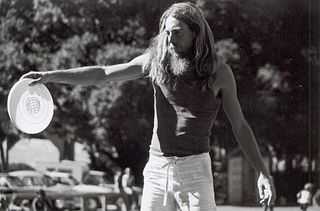
There were a few guts and distance tournaments in the 1960s but disc sports really began in the early 1970s. Westerfield and Kenner teamed up with Andrew Davidson,[21] early Canadian disc sport promoter and Jeff Otis, event coordinator for the Canadian National Exhibition (CNE), to produce the Canadian Open Frisbee Championships (beginning with disc guts and distance, later added disc golf, freestyle, ultimate and over-all disc events) at the Canadian National Exhibition and then later on Toronto Islands. Along with the IFT (International Frisbee Tournament in Northern Michigan) the Canadian Open Frisbee Championship in Toronto became one of the earliest Frisbee competition that treated the Frisbee, not as a toy, but as a new disc sport.

Before playing Frisbee was considered a sport, Ken Westerfield and Jim Kenner were the athletic equivalent of what today would be considered a professional athlete.[22] Without the usual sporting financial incentives or even awards, Westerfield and Kenner were the first of the best in Frisbee freestyle.[23] Some of today's techniques as well as competitive formats came from these pioneers.[22][24]
Freestyle is an event where teams of two or three players perform a routine which consists of a series of creative throwing and catching techniques set to music. The routine is judged on the basis of difficulty, execution and presentation. The team with the best total score is declared the winner.[23] At the 1974 Canadian Open Frisbee Championships Westerfield and Kenner introduced this event called freestyle and won it.[25][26][17][22]
Excerpt from The Decade Awards 1970-75 Top Freestyle Routine: Ken Westerfield/Jim Kenner Canadian Open 1974[24]
Considered the greatest speedflow game of all time. Ken and Jim put on a clinic to cap off a blistering hot final by all of the teams. They featured a rhythmic and dynamic style with concise catch and throw combinations. These two gentlemen are credited with creating formal disc freestyle competition. The 1973 Canadian Open did not have freestyle as an event, the end result made history.
Among the competing freestyle pairing were such Frisbee notable's as Doug Corea/Jim Palmeri, John Kirkland/Jose Montalvo, Irv Kalb/Dave "Buddha" Meyers (CHS ultimate players), Dan "Stork" Roddick /Bruce Koger, Tom Cleworth/John Connelly. This was the first freestyle competition. Ken and Jim having won, as North American Freestyle Frisbee Champions, that same year hosted the second freestyle competition at their Vancouver Open Frisbee Championships, Kitsilano Beach, Vancouver.[27] This is where Bill King Jim Brown and John Anthony of freestyle fame made their first competitive appearance.[22][28] A year later the American Flying Disc Open (AFDO) in Rochester, New York, and the 1975 World Frisbee Championships, held at the Rose Bowl in Pasadena, California, adopted Ken and Jims freestyle competition format as one of their events.[29] Today that same freestyle event is accepted as one of the premier events in flying disc tournaments worldwide.[30]

Also in 1974, Ken and Jim approached Molson Breweries with the idea of performing at basketball half-times in Canadian universities as the Molson Frisbee Team.[7] Always looking for unique ways to get into the university market, they accepted their proposal and were more than impressed with the results. The next year, Molson's up the promotional fee and used their show exclusively to introduce a new brand of beer called Molson Diamond.
In 1975 Ken and Jim, with Molson's sponsorship, moved the Canadian Open Frisbee Championships,[22] from the Canadian National Exhibition to Toronto Islands.[17] Molson's would remain sponsors of Westerfield and Kenner for several years, helping to successfully promote their product, as well as offering Ken and Jim the ability to promote their new sport everywhere.
Competitive years 1974-79
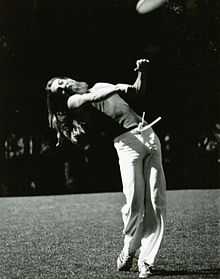
Frisbee (disc) tournaments were beginning to attract excellent disc competitors from everywhere. What was once a top selling toy from Wham-O, was becoming a serious competitive sport. Being 27 years old in 1974 (the first year of disc freestyle and over-all competitions) Kens competitive participation only span five years, but in that short time managed many wins in every disc sport.[17] Ken's first disc sport was freestyle in the 1960s. When other sports like disc golf, ultimate, double disc court and over-all events were introduced to the Frisbee scene in the early 1970s, Ken quickly excelled in these new events because many of the skills involved in these new disc sports were skills that would transfer from his freestyle play.[31]
In 1975, at the Canadian Open Frisbee Championships in Toronto, Westerfield set the MTA (maximum time aloft) world record with a sidearm throw of 15 seconds,[32][33] using a Super Pro Model Frisbee, beating the old record of 11 seconds.[34] Also in 1975 Westerfield invented a freestyle move call "body rolls",[8] (rolling the disc across outstretched arms and chest, or back), then introduced the move in a freestyle event at a national tournament in Rochester, NY called the AFDO, (American Flying Disc Open).[22] The hottest move of the day was called the "Canadian mind blower".[8] Westerfield would roll the Frisbee across outstretched arms and chest, to outstretched arms across the back (front to back roll). Today body rolls are an integral part of every freestyle routine.[35]
Beginning in 1974, Wham-O sponsored the World Frisbee Championships (WFC) that included the North American Series (NAS) Frisbee tournaments held across the U.S. and Canada. These competitions were held for the purpose of qualifying competitors to compete annually in the WFC at the Rose Bowl in Pasadena, California. Winning numerous NAS freestyle and individual events,[32] Westerfield was voted, Best Mens Player in Freestyle 1970-1975 The Decade Awards[36] and was also inducted into the Class of 2013 Disc Golf Hall of Fame[37] with the following:
Ken Westerfield is an icon of disc golf and one of the strongest overall competitors in flying disc sports of all time. His powerful and accurate sidearm throw is widely acknowledged as one of the best the sport has ever seen. He was one of the top players at the emergence of organized disc golf competition. He pioneered the growth of disc golf across Canada. Many Canadian players trace their introduction to disc golf to being mentored by Ken. His contributions are a huge part of the foundation of our sport
At a North American Series (NAS) Frisbee tournament in Dallas Texas, Westerfield became a member of the "400 club" with a prelim distance sidearm throw (also known as forehand),[33] and won the event with a throw of 378 feet,[7][35] using a 119-gram World Class Model Frisbee.
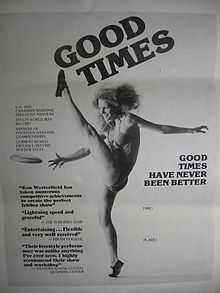
Only two competitors have officially ever thrown over 400 feet in competition with a 119-gram Frisbee (Lightweight disc by today's standard).
1978, in Boulder, Colorado, while doing a distance throwing demonstration at a North American Series (NAS) event, Westerfield threw a 119-gram World Class Model Frisbee, 552 feet, using his characteristic sidearm throw,[33] beating the official world distance record of 412 feet.[7][38][39]
This is how Kevin (Skippy) Givens, World Freestyle Champion, remembers it:[40]
"Some one paced off the distance to a building at around 500 feet. Dave Johnson,(former distance world record holder) and others we're trying to hit it.[39] Finally Dave hits the building and the crowd goes wild. Ken Westerfield was sitting and watching. After Dave hit the building the crowd started to yell for Ken to throw. At first Ken was dismissive, not interested. Finally Ken stood up, went to the line, sized up the task then let it fly. It landed in the parking lot past the building on his first throw with no warm up. The crowd went crazy. It was the most incredible throw I'd ever seen".[41]
Tournament officials marked and measured the throw at 552 feet and until 2014, was the longest distance toss for a sidearm (forehand) throw, Since new manufacturers have introduced heavy weight, bevel edge golf disc, the world distance record is now over 860 feet and just over 600 feet for the forehand (sidearm) throw.[42] However Westerfields 552 foot throw is still the longest measured distance toss for a Wham-O brand Frisbee disc.[7][33][35]
In 1977, Kenner moved to London, Ontario, and there created a disc manufacturing and distributing company called Discraft.[43] Westerfield went to Santa Cruz, California, teaming up with Tom Schot,[44] to help produce Frisbee events in Northern California, including the Santa Cruz World Flying Disc Championships and played in the first Northern California Ultimate League. Ken also created a Frisbee Show called Good Times Professional Frisbee Show that featured freestyle champion Mary Kathron,[45] and later World Freestyle Champion Brian McElwain.[46] This touring team performed shows at universities, fairs, music festivals and professional sporting events throughout the US and Canada. Returning to Toronto, Ken and Mary continued to do cross country touring shows for some of Americas largest companies, Labatt Brewing Company, Air Canada, Lee Jeans and Orange Crush.
Ultimate Frisbee in Canada (disc ultimate)
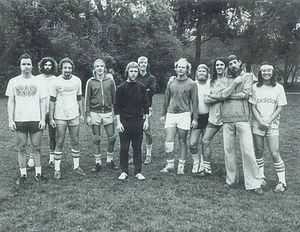
Ultimate is a team sport played with a flying disc. The object of the game is to score points by passing the disc to members of your own team on a rectangular field, 120 yards (110m) by 40 yards (37m), until you have successfully completed a pass to a team member in the opposing teams end zone. Beginning in 1975, the Canadian Open Frisbee Championships, held on Toronto Islands, introduced disc ultimate to Canadians as a showcase event. Westerfield played in these beginning ultimate exhibition games with some of the sports founders from Columbia High School (CHS), Maplewood, New Jersey, who were also there to compete in the other events at the Canadian Open competition. Ken continued to play ultimate through the 1970s, mostly while competing at U.S. over-all NAS tournaments and also played on Santa Cruz's first ultimate team called Good Times (a Santa Cruz weekly newspaper) in the first two years of the Northern California Ultimate League 1977-1978.
Returning to Toronto from California and retiring from competing in national tournaments, Westerfield continued to organize and produce local disc events in Toronto. Because of his love of ultimate, in 1979-80 Ken, with the help of Irwin Toy's Bob Blakely and Chris Lowcock, created the Toronto Ultimate League.[17] Ken started weekly ultimate pick-up games on Kew Beach than sent team invitations to Wards Island, West Toronto, North Toronto and Ken's own team the Beaches.[47] These were the first four teams with each team taking turns hosting the league games at their home locations. The league starting night was at Kew Beach. The Toronto Ultimate League developed and was renamed the Toronto Ultimate Club (TUC), that now has 3300 active members and over 250 teams playing the year round. This was the first ultimate league in Canada.[17]
Canada has been ranked number one in the Ultimate World Rankings several times since 1998 in all the Ultimate Divisions (including Open and Women's) according to the World Flying Disc Federation.[48]
In 2013, as a founding partner, the Toronto Ultimate Club presented Canada's first semi-professional ultimate team, the Toronto Rush,[49] to the American Ultimate Disc League (AUDL).[50][51][52] They went undefeated 18-0 for the season and won the AUDL Championships.[53][54]
In 2010, Ken Westerfield was inducted into the inaugural class of the Toronto Ultimate Club Hall of Fame.[7] In 2011, Ken was also inducted into the inaugural class of the Ultimate Canada Hall of Fame.[11]
This is a passage taken from the Toronto Ultimate Club Hall of Fame presentation:
In the 1970s Ken discovered the game of Ultimate in the USA and brought it to Toronto. He introduced the game at Kew Beach to an initial core of people and from there planted the seed for Ultimate Frisbee in Toronto. Ken was larger than life to this growing core of players who craved increased knowledge and skill development. He created pickup and the establishment of (4 teams) beginning in 1980. Not only was he an architect for the origins of the Toronto Ultimate Club, but Ken's influence as a player and a person made his reputation legendary. Simply put, he was the point man on all aspects of disc play, the "go to" guy that everyone looked up to.[7]
Post-Frisbee and disc sports
After retiring from playing and promoting disc sports in 1988, Westerfield went on to start a number of successful business ventures, K-West Products, importing exotic plants from South America, (1988-1992). Opening a popular biker themed rock and roll bar in downtown Toronto called the Rats Ass Saloon, (1990-1993). A motorcycle shop in West Toronto called Rockerbox Motorcycle Maintenance and Restoration, (1994-1997). Westerfield has always had a passion for helping animals and now lives on the Mexican border in the Southwestern U.S. and volunteers much of his time with several animal rescue organizations.
Awards, achievements and event timeline
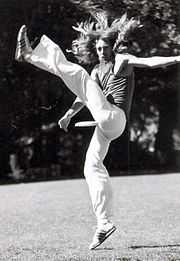

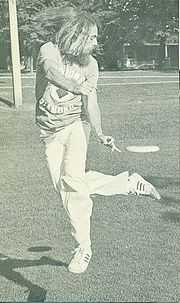
- 1963-1965 - Westerfield and Kenner become friends and play Frisbee daily at Silver lake and Cass Lake beaches through their high school years in Michigan
- 1969 - Played Frisbee to crowds, while at the Woodstock Festival.
- 1970-1975 - Voted Best Men's Player in Freestyle, The Decade Awards. [8]
- 1970-1975 - Voted Best Freestyle Routine 1974 Canadian Open, Ken Westerfield/Jim Kenner, The Decade Awards. [24]
- 1972-1976 - As the Canadian Frisbee Champions, with Jim Kenner, contracted by Irwin Toy, the Frisbee manufacturer in Canada, to perform Frisbee shows at special events across Canada.
- 1972-1985 - The Canadian Open Frisbee Championships, Toronto (co-produced and was tournament director with Jim Kenner).[22] Beginning as a guts and distance tournament, later adding freestyle, disc golf, ultimate and over-all events. [55]
- 1974 - Ken Westerfield and Jim Kenner (CEO and founder of Discraft) introduce and win the first freestyle competition at the Canadian Open Frisbee Championships, Toronto, Canada.[22]
- 1974-1977 - Molson Frisbee Team, performing Frisbee freestyle shows with Jim Kenner at special events and Canadian universities in Ontario. [11]
- 1974-1977 - Western Canada's first Frisbee competitions. The Vancouver Open Frisbee Championships at Kitsilano Beach and a Wham-O/Irwin sponsored North American Series (NAS) Tournament in Stanley Park, Vancouver, Canada (co-produced and was tournament director).[56]
- 1975 - World MTA Record 15 seconds, Canadian Open Frisbee Championships, Toronto, Canada. [34]
- 1975 - The Canadian Open Frisbee Championships introduces disc ultimate as a showcase event. Westerfield played in these beginning exhibitions along with some of the sports founders from CHS High School, Maplewood, NJ.
- 1975 - Introduced a freestyle move called a "body roll" (rolling the disc across outstretched arms and chest or back), at the American Flying Disc Open (AFDO), in Rochester, New York. [8]
- 1975-1978 - Signature endorsing the Canadian World Class Frisbee. [57]
- 1976 - Vancouver BC, appearing on the Peter Gzowski television show along with Greenpeace activist/founder David McTaggart. The next day was invited by David to do a Frisbee show at a Greenpeace ralley/protest on Kitsilano Beach in Vancouver.
- 1976-1978 - Winning 15 first place titles in only 10 North American Series (NAS) Frisbee Championships in freestyle, disc golf and individual over-all events (distance, MTA, accuracy).
- 1977-1978 - Ken played disc ultimate through the 1970s mostly while competing in U.S. over-all North American Series (NAS) tournaments and played on the Santa Cruz Good Times Ultimate Team (sponsored by the Good Times newspaper), in the first two years in Northern California Ultimate League.
- 1977-1978 - Orange Crush Frisbee Team, touring Canada doing Frisbee shows with Mary Kathron, Women's Freestyle Champion.
- 1978-1979 - Air Canada Frisbee Team, doing Frisbee shows across Canada with Mary Kathron.
- 1978 - In a North American Series (NAS) tournament in Dallas, Texas, became a member of the exclusive "400 Club" with a prelim sidearm throw, and won the event with a throw of 378 feet. Only two competitors had ever thrown a 119-gram Frisbee over 400 feet in competition.
- 1978 - In Boulder, Colorado, during a distance demonstration at an (NAS) Frisbee tournament, Ken threw a sidearm (forehand) 119-gram Frisbee 552 feet. This distance record is still the longest distance toss for a Wham-O brand Frisbee disc. Since new manufacturers introduction of bevel edge heavy weight golf disc, the distance record is now over 860 feet. [7][35][38]
- 1978 - Santa Cruz Flying Disc Classic, Santa Cruz, California (co-produced and was tournament director with Tom Schot). [58]
- 1978-1982 - Good Times Professional Frisbee Show, performing shows with Women's Freestyle Champion Mary Kathron at universities, sporting events and music festivals across Canada and the US
- 1979 - Featured in a Wham-O film, "The 1979 World Frisbee Golf Championship" WFC Disc Golf final round. Not shown in the film, the championship ended in a sudden death play-off between Ken and Snapper Pierson. [59]
- 1979-1980 - Lee Jeans Frisbee Team, freestyle shows in shopping malls and at special events with Mary Kathron.
- 1979-1980 - Toronto Ultimate League (Club), this was the first disc ultimate league in Canada. Canada is considered a powerhouse in world disc ultimate and has been ranked number one several times in the world ultimate rankings according to the World Flying Disc Federation.[48] In 2013, as a founding partner, the Toronto Ultimate Club (League) presented Canada's first semi-professional ultimate team, the Toronto Rush, to the American Ultimate Disc League. [17][52]
- 1980 - Retires from competing in freestyle and over-all competitions. Continues to organize local disc events as well as playing league and touring team ultimate, Toronto's Zero Tolerance and Darkside.
- 1983-1985 - Labatt's Schooner Frisbee Team, performing freestyle shows at special events in Canada with Brian McElwain, Patrick Chartrand and Peter Turcaj. [11]
- 1986 - World Labatt's Guts Championships, Toronto, Canada (co-produced and was tournament director with Peter Turcaj).
- 1987 - World Disc Golf Championships (PDGA), Toronto, Canada (produced and was tournament director).
- 1987 - National Champion on Toronto team Darkside. Canadian Ultimate Championships (CUC), Ottawa, Canada. [11]
- 1988 - Retires from playing ultimate and organizing disc tournaments. As Recently as 2010 has returned to collaborate on historical and performance disc sport articles and occasionally has shown up as a spectator at various disc events.
- 2010 - Inducted into the Inaugural Class of the Toronto Ultimate Club Hall of Fame. [7]
- 2011 - Inducted into the Inaugural Class of the Canadian Ultimate Hall of Fame. [11]
- 2012 - Featured in a flying disc film documentary called The Invisible String, made by a Berlin film group in Germany. [60]
- 2013 - Inducted into the U.S. Disc Golf Hall of Fame. [61]
- 2014 - Beaches Team - Special Merit - inducted into the Toronto Ultimate Club Hall of Fame (Kens first team in Toronto ultimate 1979. [62]
See also
- Tom Monroe
- Flying disc freestyle
- Ultimate Canada
- Ultimate (sport)
- Flying disc techniques
- Flying disc
- Guts (game)
- Flying disc games
- Disc Golf
External links

- Toronto Ultimate Club Hall of Fame
- Ultimate Canada Hall of Fame
- The Decade Awards 1970-75
- WFDF disc sport timeline
- Toronto Ultimate Club
- Discraft
- Evolution of Disc Golf Discs
- Toronto Rush Ultimate in Canada
- Wham-O Frisbee Disc
Newspaper articles
- Sarasota Herald-Tribune - May 21, 1978
- Florence Times Daily June 6, 1976
- The Leader-Post - Jul 14, 1976
- The Calgary Herald - Aug 11, 1979
- The Leader-Post - Aug 4, 1979
Books about Frisbee and Disc Sports
Stancil, E. D., and Johnson, M. D.; Frisbee, A Practitioner's Manual and Definitive Treatise, Workman Publishing Company, New York (July 1975); ISBN 978-0-911104-53-0
Horowitz, Judy, and Bloom, Billy; Frisbee: More Than A Game of Catch, Leisure Press, Champagne, Illinois (1984); ISBN 978-0-88011-105-8
Norton, Gary; The Official Frisbee Handbook, Bantam Books, Toronto/New York/London (July 1972); no ISBN
Danna, Mark, and Poynter, Dan; Frisbee Players' Handbook, Parachuting Publications, Santa Barbara, California (1978); ISBN 0-915516-19-5
Tips, Charles, and Roddick, Dan; Frisbee Sports & Games, Celestial Arts, Millbrae, California (March 1979); ISBN 978-0-89087-233-8
Tips, Charles; Frisbee by the Masters, Celestial Arts, Millbrae, California (March 1977); ISBN 978-0-89087-142-3
Morrison, Fred & Kennedy, Phil; Flat Flip Flies Straight! True Origins of the Frisbee, Wormhole Publishers, Wethersfield, CT (January 2006); ISBN 0-9774517-4-7
Leonardo,Tony and Zagoria, Adam co-authored "Ultimate: The First Four Decades," publ. by Ultimate History, Inc., 2005, ISBN 0-9764496-0-9
Notes and references
- ↑ Gavin, Tristan (September 19, 2013). "Frisbee Don't Sell Out". Pioneer Opinion. Retrieved October 25, 2013.
- ↑ Jordan Holtzman-Conston (2010). Countercultural Sports in America: The History and Meaning of Ultimate Frisbee. Waltham, Mass. Retrieved 6 November 2013.
- ↑ "World Flying Disc Federation". WFDF Official Website. Retrieved October 19, 2013.
- ↑ "World Flying Disc Federation". History of the Flying Disc. Retrieved October 20, 2013.
- ↑ "Professional Disc Golf Association". PDGA Official Website. Retrieved October 19, 2013.
- ↑ "American Ultimate Disc League". AUDL Official Website. Retrieved October 20, 2013.
- ↑ 7.0 7.1 7.2 7.3 7.4 7.5 7.6 7.7 7.8 7.9 "TUC Hall of Fame Ken Westerfield". Retrieved December 13, 2012.
- ↑ 8.0 8.1 8.2 8.3 8.4 "The Decade Awards 1970-75". Retrieved December 15, 2012.
- ↑ admin (1997). "PDGA Hall of Fame". 1997 Inductees. Retrieved 11 November 2011.
- ↑ Sanchez, Rodney and Bethany (2006). "Freestyle Frisbee Basics". Freestyle Players Association. Retrieved 11 November 2011.
- ↑ 11.0 11.1 11.2 11.3 11.4 11.5 "Canadian Ultimate Hall of Fame". Retrieved December 11, 2012.
- ↑ Marini, Dave. "What is Frisbee Freestyle". The Freestyle Frisbee Page. Retrieved 11 February 2011.
- ↑ Wham-O (January 9, 2009). "1979 World Frisbee Golf Championships". Youtube. Retrieved 11 February 2011.
- ↑ "Vancouver Yippie". Red Lion Publishing. Retrieved October 22, 2014.
- ↑ "The story of the first Yonge Street pedestrian mall". blogTO. March 18, 2011. Retrieved 11 November 2011.
- ↑ "History of Frisbee". Interview with Canadian Frisbee Historian Andrew Davidson produced by Nick Schofield. Retrieved January 4, 2013.
- ↑ 17.0 17.1 17.2 17.3 17.4 17.5 17.6 17.7 "History of the TUC". Retrieved January 11, 2012.
- ↑ "Frisbee Tossing has it's Expert Twist". The Leader Post. July 14, 1976. Retrieved 11 November 2011.
- ↑ "A Time-line of Frisbee History". Bill and Mike Schneider are hired by a German company to perform frisbee demonstartions through Europe. Retrieved February 23, 2015.
- ↑ "Pair of Pros". The Calgary Herald. August 11, 1976. Retrieved 12 November 2011.
- ↑ "History of Frisbee". Interview with Canadian Frisbee Historian Andrew Davidson produced by Nick Schofield. Retrieved January 4, 2013.
- ↑ 22.0 22.1 22.2 22.3 22.4 22.5 22.6 22.7 "Canadian Open, the first freestyle tournament". Freestyle Players Association. Retrieved November 12, 2011. Note: Westerfield and Kenner had been doing shows for several years before the 1974 Canadian Open. They thought freestyle was a natural addition to the traditional guts, distance and accuracy events that comprised competitions of that era.
- ↑ 23.0 23.1 "Freestyle Frisbee". The Freestyle Frisbee Page. Retrieved November 12, 2011.
- ↑ 24.0 24.1 24.2 "Top Freestyle Routine". The Decade Awards 1970-75. Retrieved November 12, 2011.Note: Considered the greatest speedflow game of all time. Ken and Jim put on a clinic to cap off a blistering hot final by all of the teams. This was also the very first formal freestyle competition ever. Ken and Jim featured a rhythmic and dynamic style with concise catch and throw combinations. These two gentlemen are credited with creating formal freestyle competition. The 1973 Canadian Open did not have freestyle as an event, the end result made history.
- ↑ "Freestyle". Discraft. Retrieved November 20, 2011.
- ↑ WFDF "Timeline of Early History". WFDF. Retrieved November 23, 2011.
- ↑ "History of Frisbee in BC". Frisbee history. Retrieved March 19, 2015.
- ↑ "Discraft History of Freestyle". Retrieved December 15, 2012.
- ↑ "1975 World Frisbee Championships Rose Bowl". Retrieved December 15, 2012.
- ↑ "Freestyle Players Association". Retrieved December 16, 2012.
- ↑ "Freestyle the Ultimate Edge". ultimaterob.com. Retrieved December 12, 2014.
- ↑ 32.0 32.1 "World Flying Disc Federation". Field Events. Retrieved May 2, 2012.
- ↑ 33.0 33.1 33.2 33.3 "Flying Disc Techniques". Forehand (Sidearm Throw). Retrieved May 2, 2012.
- ↑ 34.0 34.1 "Many Fling Disc During Competition". Sarasota Herald-Tribune. May 21, 1978. Retrieved 15 May 2012.
- ↑ 35.0 35.1 35.2 35.3 "Freestyle Frisbee Basics". Freestyle Players Association Techniques. Retrieved May 8, 2012.
- ↑ The Decade Awards 1970-1975 author: Kevin Givens. Best Mens Player Ken Westerfield Ken Westerfield Big, Strong and Athletically gifted. Known for his overall skills as well. His forehand power throw in particular is probably still unmatched for sheer power. His freestyle skills did not take a back seat. He was adept at intricate moves especially in the speedflow game. He was also an innovator. It is believed that he was the first person to do a body roll. The hottest move of the day was called the "Canadian Mind blower" which was a front roll to a foot tip to a backroll.
- ↑ "Disc Golf Hall of Fame". Discgolfhalloffame.org. Retrieved August 20, 2013.
- ↑ 38.0 38.1 "PDGA". 119 Distance Challenge. Retrieved January 4, 2013.
- ↑ 39.0 39.1 "Distance Records". Retrieved May 8, 2012.
- ↑ "Kevin Givens Freestyle Record". FPA Freestyle Results. Retrieved May 2, 2012.
- ↑ "Distance Records". Kevin Givens. 1997. Retrieved May 8, 2012.
- ↑ "WFDF Distance Records". Retrieved January 4, 2015.
- ↑ Discraft Company "Discraft Company". Retrieved June 13, 2012.
- ↑ "2000 inductees Tom Schot". Disc Golf Hall of Fame. Retrieved June 12, 2012.
- ↑ "Ken Westerfield". The Leader-Post. Aug 4, 1979. Retrieved June 12, 2012.
- ↑ "1995 FPA World Championships". Brian McElwain and Gary Auerbach. Retrieved May 2, 2012.
- ↑ "Toronto Ultimate Club Hall of Fame team award Beaches - Special merit". Retrieved October 27, 2014.
- ↑ 48.0 48.1 "WFDF World Ultimate Rankings". World Flying Disc Federation. Retrieved January 14, 2013.
- ↑ Hall, Joseph (November 23, 2012). "Toronto Rush takes flight with American Ultimate Disc League". The Star. Retrieved December 23, 2012.
- ↑ "American Ultimate Disc League". Retrieved December 26, 2012.
- ↑ "Toronto Rush Founding Partners". Retrieved December 26, 2012.
- ↑ 52.0 52.1 "Toronto Rush Ultimate History". Retrieved December 28, 2012.
- ↑ "Toronto Rush Crowned Frisbee Ultimate Champions". The Star. August 22, 2013. Retrieved August 22, 2013.
- ↑ "Toronto Rush". Retrieved December 20, 2013.
- ↑ "Ultimate Canada Hall of Fame". Brian Guthrie Hall of Fame Inductee "First Learned about Ultimate". Retrieved May 4, 2013.
- ↑ "British Columbia Disc Sports". History of BC Disc Sports. Retrieved July 24, 2014.
- ↑ "World Class Frisbee Champions". Retrieved May 29, 2012.
- ↑ Givens, Kevin. "History of Santa Cruz Tournaments". Santa Cruz Bid. Retrieved June 2, 2012.
- ↑ "Wham-O Feature Film". 1979 World Frisbee Golf Championships final round. Retrieved November 23, 2013.
- ↑ "The Invisible String". Retrieved October 22, 2014.
- ↑ "Disc Golf Hall of Fame". Ken Westerfield. Retrieved August 9, 2013.
- ↑ "Toronto Ultimate Club Hall of Fame team award Beaches - Special merit.". Retrieved October 27, 2014.
